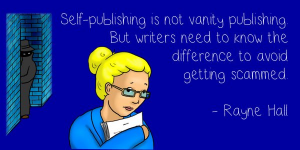If any of you good people have taken a walk around my new site, you will have seen that I offer face to face workshops and additional support on an ad hoc basis. However, there is only so much you can cover in 3 hours so I will be elaborating on various topics via the blog. I’m really aiming my workshops at those new to the idea of publishing so as a starting point here is a post about the different ways of getting published.
I firmly believe that nowadays publishing is all about choice. You may take umbrage with me on that stating that you want to be traditionally published but can’t find an agent to take you on much less a publisher. However, your decision to persevere in following that path is still your choice as you now have alternatives and that hasn’t always been the case.
Of course many authors dream of being traditionally published. Big publishing companies offer wide distribution and more exposure. Most offer an advance and sometimes it’s a large one. They do the editing, formatting and the cover art and of course they can offer marketing power although many are now expecting their authors to do more and more of this themselves.
However, as well as it being very hard to get into there are other cons to being traditionally published. It can take between six to eighteen months before your books get anywhere near the shelves. Your choices of title and cover art can be taken away from you as well as many other decisions regarding your book. The royalty rates are poor, somewhere between 6% and 25% is usual and these are only paid out twice a year. Also due to their size they can’t always wield their marketing prowess effectively and opportunities can be lost in a world where flexibility can be a huge bonus.
There are smaller independent publishing houses available which can be easier to get accepted by but these can suffer from many of the same problems as larger companies. Lack of flexibility, long publication times, and they are very likely to push books back down the queue if something more marketable comes along. It comes down to the fact that they are a business, have the same costs as an independent author as well as overheads and a payroll to meet.
In today’s fast moving online world being able to adapt to the market is important. Imagine for a moment that what you have written is a deliciously cosy romantic mystery that just begs to be read while curled up on the sofa by the fireside for an afternoon drinking mugs of marshmallow laden hot chocolate and nibbling on a plate of Hobnobs. If the weather man warns the temperature is about to plummet and snow is threatening to close roads & keep half the country at home what better time is there to put this little beauty on offer. Although perfectly possible for the independent author these publishing houses, who could have hundreds of authors on their books, don’t have the ability to react quickly to a potential sales opportunity. There is little chance of you receiving an advance and you will be expected to do much of the marketing.
During most of publishing’s history if you wanted to self-publish you would have had to invest a lot of money with a vanity press and these businesses are still around today although they will not make it clear that that is what they are. However, if what appears to be a publishing company offers to publish your book and then asks for a ‘contribution’ towards the publishing cost then they are a vanity press. This contribution can run into thousands and the author will be left with a large number of sometimes quite poorly produced books to sell themselves as they will receive no further support or help in marketing from the company. These vanity presses are not interested in you selling your books because they have already made their money from the ‘contribution’ you have paid.
And so onto self-publishing and I’ll start with the pros. Every decision is yours and you control price and cover. It’s easy to implement changes and publication is almost instant. You get paid once a month and the royalty rates are great. Anyone can do it…although I should state that this is not necessarily a good thing and it leads me straight onto the cons. The first of these is that there is a greater potential for poor quality books to be published. There is no free professional editing, formatting or cover art, there are usually fewer sales and a smaller share of the current book market. There are differing levels of self-publishing though from those who want to publish something personal, such as a memoir for their family, for them just the act of having the book published is the end result to the truly independent (indie) author who invests money in editing, proofreading and covers to produce a highly professional finish.
Although it is called self-publishing there is no need to be alone in this endeavour. There are many self-publishing companies out there who can offer an array of services to support you with the things you cannot do. There are also many individuals who offer their skills and can also do your cover design, editing or proof-reading for you. As with everything it’s best to use someone recommended and I am always happy to pass on details of those I use or who have been recommended to me. This list will also be available to all who come to my workshops.
I have only touched on the alternatives here and there are many variations on these but it gives you a flavour of what’s out there.
So, traditional versus independent and those shades of grey in between, your choice comes down to whatever works for you. As my alter ego, Georgia Rose, I had a brief dalliance with submitting to agents really because I thought it was something I should try (and I was most definitely not using that period of time as a procrastination tool to put off pressing that publish button…ahem…) but deep in my heart I knew all along I was going to self-publish. I’m a control freak, it works for me. If I’d stuck with aiming for traditional publishing I’m pretty sure I’d still be sitting here receiving rejection emails or, more commonly nowadays, listening to the sound of the tumbleweed of disinterest. As it is I have three books out there in the world living their own lives as they find readers and reviewers and this makes me happy.
Over to you now. If you have any views, comments, additions or suggestions please feel free to add them below so we can develop this melting pot of ideas and discussion.






